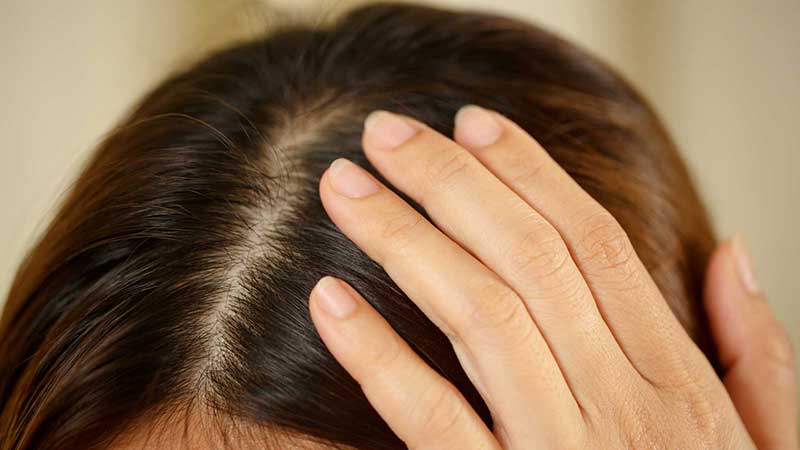 Dealing with scalp flakiness after washing your hair can be frustrating and uncomfortable. Not only can it be unsightly, but it can also be accompanied by an itchy scalp. In this article, we’ll explore the causes of scalp flakiness after washing, including dry scalp and dandruff, and provide practical tips and expert advice on how to address and prevent this issue.
Dealing with scalp flakiness after washing your hair can be frustrating and uncomfortable. Not only can it be unsightly, but it can also be accompanied by an itchy scalp. In this article, we’ll explore the causes of scalp flakiness after washing, including dry scalp and dandruff, and provide practical tips and expert advice on how to address and prevent this issue.
Key Takeaways
- Scalp flakiness after washing can be caused by dry scalp or dandruff.
- Itchy scalp often accompanies scalp flakiness.
- A proper scalp care routine and the right products can help alleviate and prevent scalp flakiness after washing.
Understanding Dry Scalp and Its Causes
If you’ve experienced a flaky scalp after washing your hair, dry scalp is likely the culprit. Dry scalp occurs when the skin on the scalp lacks the necessary moisture to stay healthy, leading to irritation and flakiness of the scalp. There are several factors that can contribute to the development of dry scalp, including:| Causes of dry scalp | Details |
|---|---|
| Weather changes | Cold or dry weather can strip the scalp of its natural oils, causing dryness and flakiness. |
| Harsh chemicals | Exposure to harsh chemicals in shampoos and hair products can irritate the scalp, leading to dryness and flakiness. |
| Age | As we age, our skin produces less oil, which can contribute to dryness of the scalp. |
| Poor diet | A diet lacking in essential nutrients, such as vitamins and minerals, can contribute to dry scalp. |
Understanding Dry Scalp vs. Dandruff
It’s important to distinguish between dry scalp and dandruff, as they can present similarly but require different treatment methods. While dry scalp is caused by a lack of moisture, dandruff is typically caused by an overgrowth of yeast or fungus on the scalp. Dandruff can also cause flakiness and itching, but it’s often accompanied by redness and inflammation of the scalp. If you’re unsure whether you’re dealing with dry scalp or dandruff, it’s best to consult with a dermatologist to determine the appropriate treatment plan.The Difference Between Dry Scalp and Dandruff
Dry scalp and dandruff share similar symptoms, but they are two distinct conditions with different underlying causes. Dry scalp occurs when the scalp doesn’t produce enough natural oils to keep it moisturized. This can be due to various factors, including age, weather conditions, harsh hair products, and certain medical conditions. Dandruff, on the other hand, is caused by the overgrowth of a yeast-like fungus called Malassezia, which can lead to inflammation and excessive flaking. Dandruff can also be triggered by a weakened immune system, hormonal changes, stress, and other factors. It’s important to note that while dry scalp and dandruff can coexist, they require different approaches to treatment. Using the wrong products or remedies can exacerbate the condition, so it’s essential to identify which condition you’re dealing with before you begin treatment.
Tips for Treating a Flaky Scalp After Washing
Dealing with a flaky scalp after washing can be frustrating, but there are several treatments and remedies you can try to alleviate the issue. Below are some expert tips to help you effectively treat your flaky scalp:1. Use a Scalp Scrub
Regularly exfoliating your scalp can help remove dead skin cells and product buildup, which can contribute to flakiness. Look for a gentle scalp scrub that contains nourishing ingredients like tea tree oil or peppermint to soothe the scalp as you exfoliate.2. Try a Tea Tree Oil Treatment
Tea tree oil has antifungal and antibacterial properties that can help alleviate dandruff and soothe an itchy scalp. You can add a few drops of tea tree oil to your แชมพูขจัดรังแค or apply it directly to your scalp with a carrier oil like coconut oil.3. Use a Moisturizing Shampoo and Conditioner
Dryness is a common cause of flaky scalp after washing, so using a moisturizing shampoo and conditioner can help keep your scalp hydrated. Look for products that contain ingredients like argan oil or shea butter to nourish and soothe the scalp.4. Apply Aloe Vera Gel
Aloe vera gel is a natural anti-inflammatory that can help soothe an itchy scalp and reduce flakiness. Apply a small amount of aloe vera gel directly to your scalp and leave it on for 30 minutes before rinsing with lukewarm water.5. Avoid Hot Water
Hot water can strip your scalp of its natural oils, leading to dryness and flakiness. Instead, wash your hair with lukewarm water and finish with a cool rinse to help seal the hair cuticle and promote scalp health.6. Change Your Diet
Poor nutrition can contribute to a dry and flaky scalp. Focus on eating a balanced diet rich in vitamins and minerals, and avoid processed and sugary foods. Consuming foods high in omega-3 fatty acids, like salmon and walnuts, can also help promote scalp and overall hair health. By following these tips and remedies, you can effectively treat your flaky scalp after washing and achieve a healthier scalp and hair.Preventing Flaky Scalp After Washing
Preventing flaky scalp after washing requires a proper scalp care routine. First and foremost, choose a gentle shampoo that doesn’t contain harsh chemicals that can dry out your scalp. Avoid washing your hair too frequently, as this can strip your scalp of its natural oils. Aim to wash your hair every 2-3 days, or as needed. In addition to washing your hair, regularly exfoliating your scalp can help keep flakes at bay. This can be done using a specialized scalp exfoliating brush or by gently massaging a mixture of sugar and olive oil into your scalp before shampooing. Be sure to also moisturize your scalp regularly. Apply a hydrating hair mask or scalp oil treatment once a week to nourish your scalp and prevent dryness. Drinking enough water and eating a healthy diet can also contribute to scalp health. If you’re prone to flakes after washing hair, try using a clarifying shampoo once a month to remove buildup and keep your scalp clean. And finally, avoid using hot water to wash your hair as it can further dry out your scalp. Use lukewarm or cool water instead.Discover the Skincare Magic of Drunk Elephant
Tips for Resolving Scalp Flaky After Washing:
If you’re dealing with a flaky scalp after washing, there are several steps you can take to alleviate the issue and improve your hair health. Here are some expert tips:1. Stick to a Scalp Care Routine:
Establishing a regular scalp care routine can help prevent and treat flaky scalp. Use a gentle shampoo that’s free of sulfates, parabens, and other harsh chemicals, and avoid over-washing your hair. Massage the scalp gently while shampooing to improve blood circulation and dislodge any flakes.2. Try Natural Remedies:
Several natural remedies can soothe an itchy and flaky scalp. Apply tea tree oil, aloe vera gel, or coconut oil directly to the scalp and let it sit for a few minutes before rinsing. These natural ingredients have antifungal and anti-inflammatory properties that can help reduce scalp irritation and flakiness.3. Use Medicated Shampoo:
If you have severe dandruff or a fungal infection, your dermatologist may recommend a medicated shampoo that contains ingredients like ketoconazole or selenium sulfide. These shampoos can help eliminate the fungus or yeast that’s causing the flakes, but they should be used under the guidance of a healthcare professional to avoid any side effects.4. Keep a Healthy Diet:
Eating a balanced diet that’s rich in vitamins and minerals can help improve your scalp and hair health. Include foods like leafy greens, nuts, and fish in your diet, as they contain omega-3 fatty acids and antioxidants that can nourish your scalp and hair follicles. By following these tips, you can get rid of flaky scalp after washing and maintain a healthy scalp and hair. Remember, consistency is key when it comes to scalp care, so be patient and persistent in your efforts. Your hair will thank you for it!What Are the Origins of Wine and its Popularity in the Past?
The origins of wine consumption in historical context can be traced back to ancient civilizations, such as the Egyptians and Greeks, who valued wine for its medicinal and religious purposes. Wine’s popularity grew as it became associated with social status and pleasure, spreading through trade routes and reaching various cultures. Its rich history has contributed to its enduring popularity across different time periods and continents.
